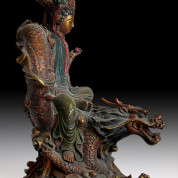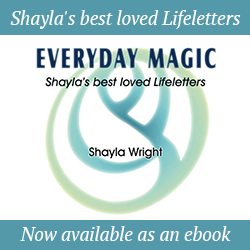
When she was about 11, my daughter said something to me that stayed with me for years. “There are two kinds of pain,” she said, “the pain of being frozen and stuck, and the pain that happens when we are open, feeling something deeply, when things are flowing and moving through us.” I felt the wisdom in that statement drop into me like a seed. That seed sprouted slowly into an ongoing sense of wonder about all the ways in which we try to protect ourselves from life. Why not? Human life is so incredibly uncertain, delicate, unpredictable.
Anything can happen to us: things we would never ask for. Sometimes these events, these losses and defeats, take years for us to pass through. This is how it is for all of us– the kind of security we dream about, the kind of control we imagine, is not really possible. I remember, after the market crashed in 2008, I had people speaking to me from all over, telling me about how long they have stayed at a job that meant nothing to them, in the hopes of building up some financial security. “I thought it was important, “ one man said to me, “and now I realize, there’s nowhere I can put what’s left of my money where it will be safe. What was I thinking? And what have I been doing all these years?”
Great question, and a heartbreaking one. Sometimes those questions feel like sharp arrows that pierce us, right to the core. Like a splinter in the foot that you can’t reach. I told this man that I think we can find out how to open to the “whole catastrophe,” as Zorba the Greek called it, that it’s never too late for this. We cannot discover what it is to be fully human without being willing to experience loss, over and over again. If we are not willing, if we cling to one side of life, and reject the other, then grief and pain get frozen inside us. We feel oppressed by life, as if a fire-breathing dragon is waiting for us somewhere.
I’ve listened to people speaking to me recently about how hard it is for them to be around their aging parents. They feel the rigidity, the brittleness that happens when we keep retreating, hiding, resisting the wild, chaotic flow of life. “I don’t want to end up like that,” one of them said. “I want to keep flowing, letting go, welcoming what life brings to me.” Sometimes this feels like a widening of the river of our life, opening to more and more, protecting ourselves less and less, releasing our attachment to a solid, fixed identity. And sometimes it just feels like too much, and the mind wants to shut everything down, turn away from the dragons of fear, despair and helplessness.
A while ago I went up to our hospital, where the daughter of a dear friend of mine was giving birth. I walked in the doors of that hospital and remembered the dear ones who had died there, had miscarriages, gone through detox, struggled with cancer. I wandered around for a while, stunned by the depth and power of all that had happened in that small building.
Malidoma Some, the African indigenous teacher and shaman, talks about life in his community: “We were a large village,” he says, “but we all knew each other. Almost every week, someone would die, or give birth, or get married. Celebration and grieving were both part of our everyday lives.” In our culture, it feels as if we have flattened everything out, in an effort to find some comfort, some ease. We flee from the intensity of the moment to the company of our machines– our cell phones, computers, iPod, cars, TV’s. Machines don’t feel anything. They offer us a refuge, or so it seems, from the dragons of our suffering.
Malidoma tells a powerful story about how our western world relates to grief. He was invited a few years ago to a global ceremony at Arlington Cemetery in Washington, a collective mourning for all the people lost in war. Teachers, artists, statesmen and leaders from all over the world came to bear witness to the kind of suffering that war brings to us all.
Malidoma described the long evening, and how he waited, as speeches were made, as candlelit processions passed by, and as songs were sung, for some genuine expression of grief. He assumed that it was all building up to that—that this outpouring of grief would be the climax of the whole ceremony. As the evening progressed, he realized it was ending, and he had only seen a few people weeping. “My God,” he thought, “these people really do not know how to sob their guts out.”
No Malidoma, I thought when I read that, we do not. No-one ever taught us how to meet our dragons. We don’t know how to grieve together. We don’t know how to feel. We are walking around with so many old feelings stuck inside us.
I understand, with all the chaos and destruction happening on our planet right now, that the idea of feeling our grief might be overwhelming. But the idea of it and the experience of it are so very different. We can begin to honour the grief that we carry, simply because it is here. We can actually begin to transform our relationship with suffering, with the dragons that are chasing us.
If we can allow ourselves to feel whatever is here, not all of it, but just a little bit at a time, something softens deep inside our heart. We can simply sit down for ten minutes, without any agenda, and listen, without expecting anything, to these sore and tender places in our own being. This is not about moping around and indulging in all sorts of sad stories about how hard it is when we don’t get what we want. That’s not grief, that’s depression, bitterness. Depression leaves no room for the birth of compassion.
Opening to our grief is different. When we make direct contact with it, it’s no longer frozen, it’s fluid and alive. It starts moving, like a small stream, deep in our personal lives. If we open to it, it carries us into a huge river, where we all move together, through birth and death, loss and celebration, without much control over any of it. In this raw, vulnerable place, the last place we would ever choose to be, there is tremendous kindness and gentleness. From that place, we do not strike out, or punish or blame. We are able to simply be where we are, without struggling to change anything. In that place, which is open and without boundaries, it becomes clear that cruelty and violence are what happen when we just don’t know what to do with our own suffering.
Tara, or Kuan Yin, the goddess of compassion, is often pictured riding on a dragon. This is a metaphor for her capacity to ride the waves of suffering, grief, anger, fear and loss, to ride these waves by opening directly to their raw energy.
May we all find the courage to turn toward our own dragons, and learn to ride them. Life is asking this of each one of us-nothing more or less.
The Well of Grief
Those who will not slip beneath
The still surface on the well of grief
Turning downward through its black water
To the place we cannot breathe
Will never know the source from which we drink,
The secret water, cold and clear,
Nor find in the darkness glimmering
The small round coins
Thrown by those who wished for something else.
-David Whyte
with love,
Shayla
4 Comments
Join the conversation and post a comment.


There’s something so honest and bonding about truly sharing grief. Friendships where we’ve been able to share this place are by far the deepest. Sometimes it can feel strange to be part of a society where there’s so much denial about these kinds of deep emotions.
A beautiful piece Shayla… thank you for the clarity of your heart that can articulate with such precious tenderness and deep understanding of “what is” – all that is so crucial to face and meet in my own heart for me to live in the fullness of my own being. Thank you. I am always touched by what you write., grateful your voice exists.
Another beautiful sharing Shayla…… deep truth that resides at the core of our beings, but which so few of us can find the words for…. thank you for being that voice.
These words are like finding gold for me today. Thank you Shayla.